新概念第一册85-86
(完整版)新概念英语第一册lesson85-86重点解析
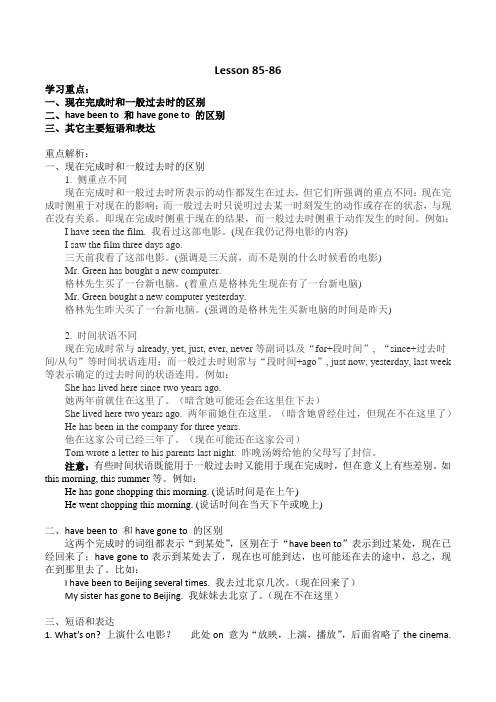
Lesson 85-86学习重点:一、现在完成时和一般过去时的区别二、have been to 和have gone to 的区别三、其它主要短语和表达重点解析:一、现在完成时和一般过去时的区别1. 侧重点不同现在完成时和一般过去时所表示的动作都发生在过去,但它们所强调的重点不同:现在完成时侧重于对现在的影响;而一般过去时只说明过去某一时刻发生的动作或存在的状态,与现在没有关系。
即现在完成时侧重于现在的结果,而一般过去时侧重于动作发生的时间。
例如:I have seen the film. 我看过这部电影。
(现在我仍记得电影的内容)I saw the film three days ago.三天前我看了这部电影。
(强调是三天前,而不是别的什么时候看的电影)Mr. Green has bought a new computer.格林先生买了一台新电脑。
(着重点是格林先生现在有了一台新电脑)Mr. Green bought a new computer yesterday.格林先生昨天买了一台新电脑。
(强调的是格林先生买新电脑的时间是昨天)2. 时间状语不同现在完成时常与already, yet, just, ever, never等副词以及“for+段时间”, “since+过去时间/从句”等时间状语连用;而一般过去时则常与“段时间+ago”, just now, yesterday, last week 等表示确定的过去时间的状语连用。
例如:She has lived here since two years ago.她两年前就住在这里了。
(暗含她可能还会在这里住下去)She lived here two years ago. 两年前她住在这里。
(暗含她曾经住过,但现在不在这里了)He has been in the company for three years.他在这家公司已经三年了。
(现在可能还在这家公司)Tom wrote a letter to his parents last night. 昨晚汤姆给他的父母写了封信。
新概念第一册85-86

I. Revision:
Now let's do some exercises:
II. Complete the sentences with the words given in the correct form. 1. This is the first time I have______(be) been in Australia. is writing 2. My brother__________(write) a letter at the moment. did 3. Tom_____(do) his homework just now, has finished but now he___________(finish) already. goes 4. May often______(go) shopping on Friday, but she ______(stay) at home last Friday. stayed 5. Listen, someone___________(knock) at is knocking the door.
否定式: 主语 + haven’t / hasn't + 过去分词 + 其他。 疑问式: Have / Has + 主语 + 过去分词 + 其他? 简略答语: Yes, 主语 + have / has.(肯定) No, 主语 + haven’t / hasn't.(否定)
(3)一般现在完成时通常与表示不确定的时间副词或短语连用 如 just, already, before, never, ever, twice, three times 等。 (4)现在完成时在汉语中常用“了”、“过”或“已经”来表 示。
(完整版)新概念英语第一册lesson85-86重点解析

(完整版)新概念英语第一册lesson85-86重点解析Lesson 85-86学习重点:一、现在完成时和一般过去时的区别二、have been to 和have gone to 的区别三、其它主要短语和表达重点解析:一、现在完成时和一般过去时的区别1. 侧重点不同现在完成时和一般过去时所表示的动作都发生在过去,但它们所强调的重点不同:现在完成时侧重于对现在的影响;而一般过去时只说明过去某一时刻发生的动作或存在的状态,与现在没有关系。
即现在完成时侧重于现在的结果,而一般过去时侧重于动作发生的时间。
例如:I have seen the film. 我看过这部电影。
(现在我仍记得电影的内容)I saw the film three days ago.三天前我看了这部电影。
(强调是三天前,而不是别的什么时候看的电影)Mr. Green has bought a new computer.格林先生买了一台新电脑。
(着重点是格林先生现在有了一台新电脑)Mr. Green bought a new computer yesterday.格林先生昨天买了一台新电脑。
(强调的是格林先生买新电脑的时间是昨天)2. 时间状语不同现在完成时常与already, yet, just, ever, neve等副词以及“ fo叶段时间” ,“since+过去时间/从句”等时间状语连用;而一般过去时则常与“段时间+ago” , just now, yesterday, last w eek 等表示确定的过去时间的状语连用。
例如:She has lived here since two years ago.她两年前就住在这里了。
(暗含她可能还会在这里住下去)She lived here two years ago.两年前她住在这里。
(暗含她曾经住过,但现在不在这里了)He has been in the company for three years.他在这家公司已经三年了。
新概念英语-第一册--lesson85-86-Paris-in-the-spring-幻灯片课件
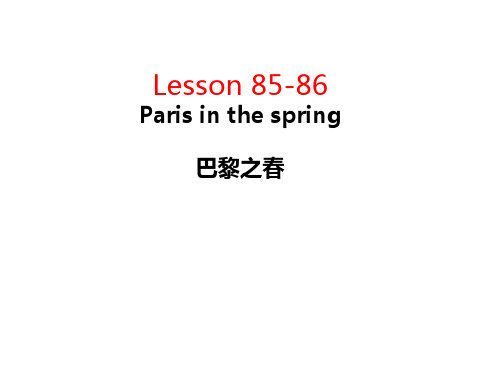
never stopped.
just是“就,正好
,恰恰”的意思。 like是“像”的意 思
all the time 一 直,始终
• Just like London! = The weather in Paris in spring is just like the weather in London in spring.
Have you ever been there, Ken? KEN:Yes, I have. I was there in April.
in April
月份前面不用冠词
never: 表否定,表示绝不,从来没有。 ever: 用于疑问句,表示曾经,在任何时候 never 和 ever 都是 完成时态 的标志词。
We go to the__ci_n_e_m__a_to see a film. We go to the__th_e_a_t_r_e_to see a play.
★ film n. (1)n.电影
film (英式英语)
movie (美式英语)
never & ever
never 从来没 有,决不
如: ① My father has been to Beijing many times.
我父亲去过北京许多次了。(画外音: 已经从北京回来了。)
② My father isn’t in. He has gone to Beijing.
我父亲不在,他去北京了。 (画外音:他还在北京,没有回来。)
Lesson 85-86
Paris in the spring
巴黎之春
Questions
1.Has Ken just been to the cinema?
新概念英语第一册第85-86课课件 (共26张PPT)
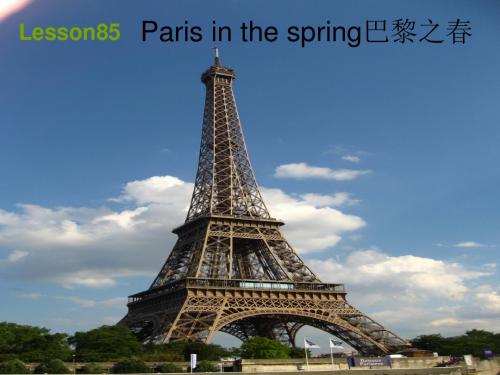
cinema n.电影院 We are going to the cinema tomorrow. 明天我们打算去电影院。
theatre 剧院,戏院
a film star 电影明星/watch/see the film 看电影
例如: We go to the________to see a film. We go to the________to see a play.
film
cinema
new words Paris n. 巴黎
cinema n.电影院
film
n.电影
beautiful adj.漂亮的
city
n城市
never adv.从来没有
ever adv.在任何时候
Paris 巴黎(法国首都)
London 伦敦 (英国首都)
Tokyo 东京 (日本首都)
中表示“以往任何时候”、“曾经”、“在任何 时候”、“从来”这类的意思。
have been to a place与have gone to a place 的区别
have been to: 表示曾经去过某 地,但现在不在 那了,去而已归, 人现在在哪里不 知道。
have gone to: 表示已经去某 地了,现在在 那个地方或正 在去的路上, 去而未归。
Homework
1. To finish the exercises after the text. 2. To practise the structures learned during the class.
A new film is now on. 今天晚上电视上有什么节目?
What’s on television tonight?
新概念英语第一册第85-86课_Paris in the Spring

新概念英语第一册第85-86课:Paris in the SpringLesson 85 Paris in the spring巴黎之春听录音,然后回答问题。
肯是在什么季节访问巴黎的? George: Hello, Ken.乔治:你好,肯。
Ken: Hello, George.肯:你好,乔治。
George: Have you just been to the cinema?乔治:你刚去过电影院吗?Ken: Yes, I have.肯:是的,我刚去过。
George: What’s on?乔治:上映什么片子?Ken: “Paris in the Spring”.肯:《巴黎之春》。
George: Oh, I’ve already seen it.I saw it on television last year. It’s an old film, but it’s very good.乔治:噢,我已看过了。
我是去年在电视上看的。
这是老部片子,但很好。
Ken: Paris is a beautiful city.肯:巴黎是座美丽的城市。
George: I have never been there. Have you ever been there, Ken?乔治:我从未去过。
肯,你去过吗?Ken: Yes, I have. I was there in April.肯:是的,我去过。
4月份我在那儿。
George: Paris in the spring, eh?乔治:那是巴黎之春,是吗?Ken: It was spring, but the weather was awful. It rained all the time.肯:是春天,但天气太糟了。
一直在下雨。
George: Just like London!乔治:就像伦敦一样!New words and Expressions 生词和短语Parisn. 巴黎cineman. 电影院filmn. 电影beautifuladj. 漂亮的cityn. 城市neveradv. 从来没有everadv. 在任何时候Notes on the text 课文注释1 have been to... 到过...。
新概念英语第一册85-86课课件
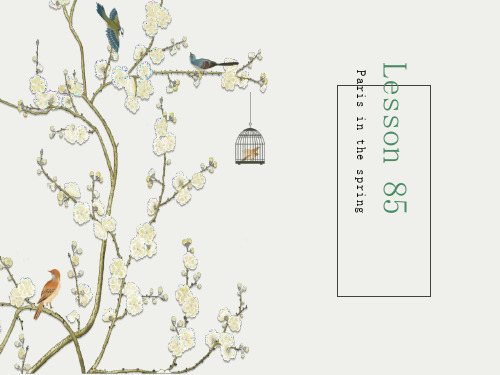
Paris in the spring
单词学习
壹
现在完成时的特殊结构
貳
课文讲解
叁
练习
肆
口语练习
陆
日常用语
伍
本课内容
单词学习
never adv. 从来没有
beautiful adj. 漂亮的
cinema n. 电影院
现在完成时专项训练
现在完成时练习题L85-86.doc
homework
背诵本课文,抄写本课单词3英1汉1听写。 完成本课练习册。 每天听录音读课文10分钟. 整理语法到语法本上背过。 听写改错。 预习L87-88,单词6英1汉,读熟。
单击此处添加大标题内容
Hello , Ken. Hi , George. Have you ____ ___ ___the cinema? Yes , ___ __. What ‘s _____? ‘Paris in the Spring’. Oh , I’ve ____ ____it . I ___ ___ ___ ___last year . It’s an ___ ___, but it’s ___ ___.
课文讲解
Have you just been to the cinema?
现在完成时,表示去过某地而现在已经回来了。
这里的just是“刚刚,刚才”的意思。
What’s
有一个新电影正上演。
A new film is now on.
今天晚上电视上有什么节目?
6
never 通常用于陈述句中,表示“绝不、从来没有”。
7
ever 通常用于疑问句中,表示“曾经、在任何时候”。
8
我从来没去过西班牙。 I have never been to Spain. 你曾经去过西班牙吗? Have you ever been to Spain? It rained all the time. 一直、始终(同义句) = The rain never stopped. I have already read this book.(变疑问句 ) Have you read this book yet? 注意 (变疑问句时already要变为yet)
新概念英语第一册85-86课最新版本ppt课件
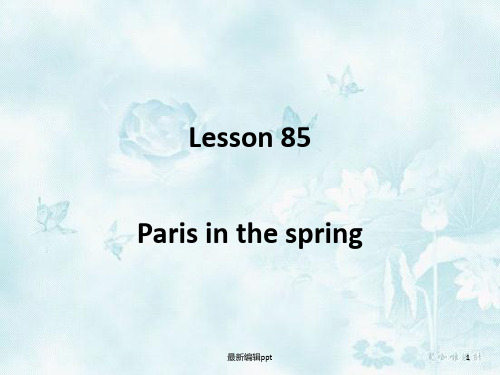
★beautiful adj. 漂亮的
① adj. 美丽的,使生美感的
• She was even more beautiful than I had expected.
• 她甚至比我预期的还要美。
② adj. 出色的,完美的;令人愉悦的
• He did a beautiful job of painting the desk.
• 他油漆了书桌,活干得很漂亮。
• beauty n. 美人,美景,美好的东西
最新编辑ppt
5
现在完成时的特殊结构
• have/has been to a place 曾经去过某地,但现在不在那个地方 了
• have/has gone to a place 已经去那个地方或正在去的路上,到 达与否不确定
• ever 通常用于疑问句中,表示“曾经、在 任何时候”。
最新编辑ppt
10
• 我从来没去过西班牙。 • I have never been to Spain. • 你曾经去过西班牙吗? • Have you ever been to Spain? • It rained all the time. 一直、始终 = The rain never stopped.
• The hotel is just like home. • 夏威夷就像天堂一样。
• Hawai is just heaven.
最新编辑ppt
12
• I’ve already seen it.
• 现在完成时(画外音:我知道那电影的内 容)
• I saw it on television last year.
• 一般过去时(强调在过去的某个具体的时 间发生的事)
新概念英语第一册第85-86课-Paris-in-the-Spring

新概念英语第一册第85-86课:Paris in the Spring Lesson 85 Paris in the spring巴黎之春Listen to the tape then answer this question.At what time of year did Ken visit Paris?听录音,然后回答下列问题。
肯是在什么季节访问巴黎的?George: Hello, Ken.乔治:你好,肯。
Ken: Hello, George.肯:你好,乔治。
George: Have you just been to the cinema?乔治:你刚去过电影院吗?Ken: Yes, I have.肯:是的,我刚去过。
George: Whats on?乔治:上映什么片子?Ken: “Paris in the Spring”.肯:《巴黎之春》。
George: Oh, Ive already seen it.I saw it on television last year. Its an old film, but its very good.乔治:噢,我已看过了。
我是去年在电视上看的。
这是老部片子,但很好。
Ken: Paris is a beautiful city.肯:巴黎是座秀丽的城市。
George: I have never been there. Have you ever been there, Ken?乔治:我从未去过。
肯,你去过吗?Ken: Yes, I have. I was there in April.肯:是的,我去过。
4月份我在那儿。
George: Paris in the spring, eh?乔治:那是巴黎之春,是吗?Ken: It was spring, but the weather was awful. It rained all the time.肯:是春天,但天气太糟了。
新概念英语第一册85_86课件

Revision
现在完成时
构成: S(主语) + have/ has+ 动词过去分词 注意:这里的have是助动词,无意义 have-had-had
现在完成时的时间状语(特征词) • already 已经 yet 还 • ever 曾经 never从不 just刚刚 • for+一段时间 • since+时间点 since 2006 • since +时间段+ago
eg:I‘m just making tea for you. 我正要为你沏茶。
2. I've already seen it.
already:已经
eg:I have
already read this book.我 已经读过这本
seen是see 的过去分词
书了。
it:代词
代指“Paris of the spring” 这部电影
since two years ago
2019/8/2
规则动词过去分词和过去式变法一样
1. + ed
clean --- cleaned
2. + d
arrive --- arrived
3. 辅音字母+y结尾的 把y 变i + ed empty --- emptied
• New words
Paris 巴黎(法国首都)
What is the largest city in China? 中国最大的城市什么?
Shanghai is the largest city in China. 上海是中国最大的城市。
city life 都市生活 country life 田园生活或乡村生活
新概念第一册 Lesson85--86课件

sometimes,
I often read books.
He likes music
一般过去 过去发生
过去式 was/were, did
yesterday, last---, --ago, after---
I was there last month. I went to Paris last year.
② My father isn’t in. He has gone to Beijing.
have been to 与 have gone to 的区别:
have been to 表示曾经去过某地, 已经回来了
have gone to 表示去了某地,还没有回 来(可能在路上,可能还在那里)
GEORGE: What's on?
Lesson 86 What have you done? First let's review three tenses:
时态 用法
动词形式 时间状语标 志词
例句
一般现在 一般,经 原形/三单 every day,
时
常,习惯,am/is /are;
真理
dodoes
always, usually, often,
We go to the__ci_n_e_m__a_to see a film. We go to the__th_e_a_t_r_e_to see a play.
★ film n. (1)n.电影 film (英式英语) movie (美式英语)
never & ever
never 从来没有,决不
I
have never been
there.
Lesson 86 What have you done?
新概念英语第一册Lesson85-86笔记(语法点+配套练习+答案)
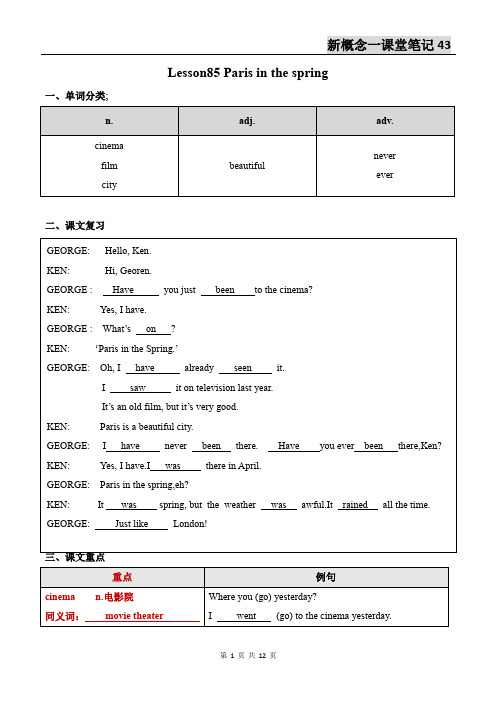
3. Mr. Wang has taught in this schoolforten years.
4.‘Have youeverseen the film?’
‘No, I haveneverseen it.’
5.‘Has the bus leftyet?
‘Yes, it hasjustleft.’
2.过去分词的规则变化:
ABB
原形
过去式
过去分词
原形
过去式
过去分词
通风
air
aired
aired
跳舞
dance
danced
danced
玩
play
played
played
购物
shop
shopped
shopped
变得
Thebeautywho wears abeautifuldress dancesbeautifully.
What abeautiful(beautiful, beautifully) castle!
Howbeautifully(beautiful, beautifully) those birds sing!
Where you (go) yesterday?
Iwent(go) to the cinema yesterday.
Ihave been(be) to the cinema only once.
I likegoing(go) to the cinemato see(see) movies.
How aboutgoing(go) to the movie theater?
新概念英语第一册Lesson85-86课件(共43页)解析
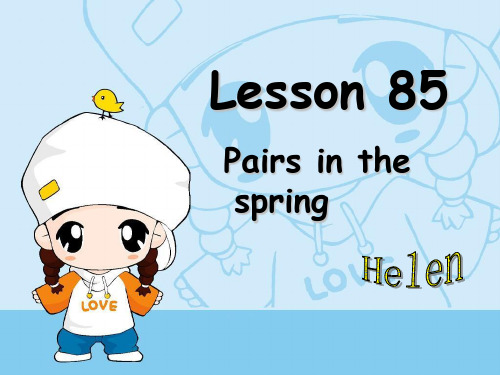
nerver & ever
never 决不, 从不
ever 曾经,永远,究竟
I will never forget your kindness. 我永远忘不了你的好意。
Have you ever been to Paris? 你去过巴黎吗?
活到老,学到老。
even been there,Ken?
KEN: Yes, I have.I _w_a_s__t_he_r_e in April.
GEORGE: Paris in the spring,eh?
KEN: It was spring, but the weather was aw
ful.It
rained
all
the
time.
GEORGE: __J_u_st__li_k_e_____ London!
三,词汇学习
英国妈妈是这样教宝贝说话的~~~
如果你是宝贝,能理解妈妈的话吗,能照妈 妈的话做吗?Hey, babe~~~
英国妈妈是这样教宝贝说话的~~~
Hey, babe~~~, try to write it down:
我们会被允许吗?
One is never too old to learn. Could we ever get permission?
GEORGE: Hello, Ken. just刚刚,刚才 KEN: Hi, George.
GEORGE: Have you just been to the
cinema?
Lesson 85 Paris in thespring
★ beNaeuwtifuwl oarddj.s漂a亮nd的expressions:
新概念英语第一册Lessons85-86知识点讲解同步习题.doc
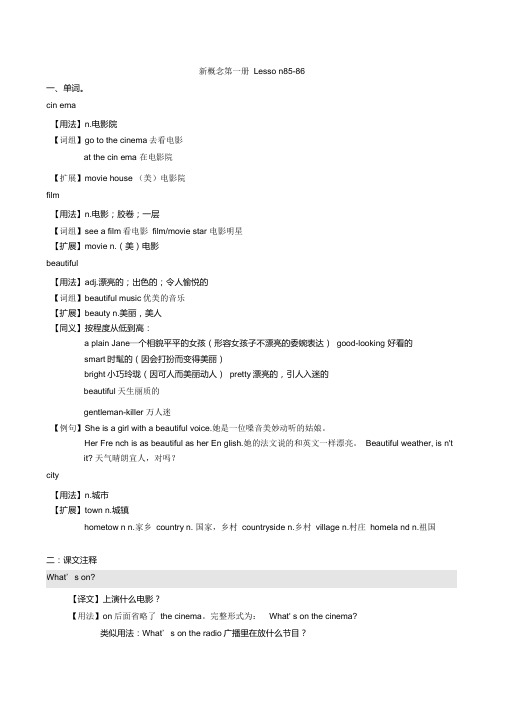
新概念第一册Lesso n85-86一、单词。
cin ema【用法】n.电影院【词组】go to the cinema去看电影at the cin ema 在电影院【扩展】movie house (美)电影院film【用法】n.电影;胶卷;一层【词组】see a film看电影film/movie star 电影明星【扩展】movie n.(美)电影beautiful【用法】adj.漂亮的;出色的;令人愉悦的【词组】beautiful music优美的音乐【扩展】beauty n.美丽,美人【同义】按程度从低到高:a plain Jane—个相貌平平的女孩(形容女孩子不漂亮的委婉表达)good-looking 好看的smart时髦的(因会打扮而变得美丽)bright小巧玲珑(因可人而美丽动人)pretty漂亮的,引人入迷的beautiful天生丽质的gentleman-killer 万人迷【例句】She is a girl with a beautiful voice.她是一位嗓音美妙动听的姑娘。
Her Fre nch is as beautiful as her En glish.她的法文说的和英文一样漂亮。
Beautiful weather, is n't it? 天气晴朗宜人,对吗?city【用法】n.城市【扩展】town n.城镇hometow n n.家乡country n. 国家,乡村countryside n.乡村village n.村庄homela nd n.祖国二:课文注释【译文】上演什么电影?【用法】on后面省略了the cinema。
完整形式为:What' s on the cinema?类似用法:What' s on the radio广播里在放什么节目?What's on the television?电视里在放什么节目?be on意为放映,上演,播放”。
新概念第一册Lesson85-86知识点及拓展

新概念第一册Lesson85-86知识点及拓展Lesson 85-86Pairs in the springGEORGE: Hello, Ken.KEN: Hi, George.GEORGE: Have you just been to the cinema?KEN: Yes, I have.GEORGE: What’s on?KEN: ‘Paris in the spring’.GEORGE: Oh, I’ve already seen it.I saw it on television last year.It’s an old film, but it’s very good.KEN: Paris is a beautiful city.GEORGE: I’ve never been there.Have you ever been there, Ken?KEN: Yes, I have. I was there in April.GEORGE: Pairs in the spring, eh?KEN: It was spring, but the weather was awful.It rained all the time.GEORGE: Just like London!1. Have you just been to the cinema?1)这是现在完成时的一般疑问句,主语是you,助动词用have.2)just 刚刚,刚才(通常与完成时连用,有时也与过去时连用)--He has just bought a second hand car.--We just arrived.--just “正要…”“刚要….”(常用进行时或be going to do 连用) --I am just making tea for you.--She was just about to fall asleep when the telephone rang. 3)have been to a place表示曾经去过某地,但现在不在那个地方了,去而复归;have gone to a place表示己经去某地了,现在在那个地方或正在去的路上,去而未归。
- 1、下载文档前请自行甄别文档内容的完整性,平台不提供额外的编辑、内容补充、找答案等附加服务。
- 2、"仅部分预览"的文档,不可在线预览部分如存在完整性等问题,可反馈申请退款(可完整预览的文档不适用该条件!)。
- 3、如文档侵犯您的权益,请联系客服反馈,我们会尽快为您处理(人工客服工作时间:9:00-18:30)。
Lesson 85 Paris in thespring New words and expressions:
★ beautiful adj. 漂亮的 ① 美丽的,使生美感的 • She was even more beautiful than I had expected. 她甚至比我预期的还要美。 ② adj. 出色的,完美的;令人愉悦的 • He did a beautiful job of painting the desk. 他油漆了书桌,活干得很漂亮。 • n. beauty n. 美人,美景,美好的东西 • beauty contest 选美 • adv. beautifully beautifully eg.She dances_________ (beautiful).
CAROL: Hello, Sam. Come in. TOM: Hi, Sam. We're having lunch. Do you want to have lunch with us? SAM: No, thank you. Tom. I've already had lunch. I had at half past twelve. CAROL: Have a cup of coffee then. SAM: I've just had a cup, thank you. I had one after my lunch. TOM: Let's go into the living room, Carol. We can have our coffee there.
Lesson 85 Paris in thespring New words and expressions:
★ Paris
/'pæ rɪs/
n.巴黎
Paris is the capital of France. Paris in the spring 巴黎之春
★ cinema
/'sɪnɪmə/ n.电影院 theatre 剧院,戏院
Lesson 85-86 Paris in the spring
巴黎之春
Daily English
I am behind you.
我挺你!
• What is the distance between the first letter and the last letter of “smiles”?
否定式: 主语 + haven’t / hasn't + 过去分词 + 其他。 疑问式: Have / Has + 主语 + 过去分词 + 其他? 简略答语: Yes, 主语 + have / has.(肯定) No, 主语 + haven’t / hasn't.(否定)
(3)一般现在完成时通常与表示不确定的时间副词或短语连用 如 just, already, before, never, ever, twice, three times 等。 (4)现在完成时在汉语中常用“了”、“过”或“已经”来表 示。
I’ve just been to the library.
have been to 与 have gone to 的区别:
have been to 表示曾经去过某地,已经回来了;
have gone to 表示去了某地,还没有回来(可能在路上, 可能还在那里);
如:
① My father has been to Beijing many times. 我父亲去过北京许多次了。(画外音:已经从北京回来了。)
② My father isn’t in. He has gone to Beijing. 我父亲不在,他去北京了。
(画外音:他还在北京,没有回来。)
GEORGE: What's on? KEN: 'Paris in the spring'. GEORGE: Oh, I've already seen it. I saw it on television last year. be on 是上演的意思, It's an old film, 也可理解成在荧幕上 but it's very good.
I. Revision:
CAROL: Excuse the mess, Sam. This room's very untidy. We're packing our suitcases. We're going to leave tomorrow. Tom and I are going to have a holiday SAM: Aren't you lucky! TOM: When are you going to have a holiday, Sam? SAM: I don't know. I've already had my holiday this year. CAROL: Where did you go? SAM: I stayed at home!
Lesson 85 Paris in thespring New words and expressions:
nerver & ever
never 决不, 从不
I will never forget your kindness. 我永远忘不了你的好意。
ever 曾经,永远,究竟
Have you ever been to Paris? 你去过巴黎吗?
Lesson 85 Paris in the spring New words and expressions:
1. Paris /'pæ rɪs/ n.巴黎 2. cinema /'sɪnəmə/n.电影院 3. film /fɪlm/ n.电影 4. beautiful/'bju:tɪfəl/ adj. 漂亮的 5. city /'sɪtɪ/ n. 城市 6. never /'nevə/ adv. 从来没有 7. ever /'evə/ adv. 在任何时候
cinema We go to the________to see a film. theatre We go to the________to see a play.
Lesson 85 Paris in thespring New words and expressions: ★ film n.
I. Revision:
Grammar points in L83-84
The Present Perfect Tense(现在完成时 )
(1)现在完成时表示过去发生或已经完成的动作对现在造成的 影响或结果,也可表示过去已经开始,一直延续到现在的动作或状 态。 (2)构成:主语 + have/has + 过去分词 + 其他。(当主语是第三 人称单数时用has,其余人称用have。过去分词:规则动词的过去 分词构成与动词过去式相同;不规则动词需要特殊记忆。)
此题答案是:One mile. 问的是smiles这个单词中,第 一个字母和最后一个字母之间的距离有多长,即除去第 一个和最后一个字母s,剩下的是mile。
• What of us goes up and never comes down?
Our age
I. Revision:
Text in L83-84
I. Revision:
Now let's do some exercises:
I. Fill in the blanks with the correct answers:
(D )1. ___, Mum. I’m looking for my toy car. A. Excuse the mess for me B. Excuse mess C. Excuse me with the mess D. Excuse the mess ( C)2.A:Billy, go and do your homework. B:Oh, Mum. I have___finished my homework. A. yet B. ever C. already D. never ( A)3. I___a holiday next month. A. am going to have B. have had C. have D. had ( C)4. A: Have you___your lunch? B:Yes, I___it an hour ago. A. have; had B. had; have C. had; had D. have; have (A )5.A: Did you read the book last night? B:No, I____it three times. A. have read B. was reading C. have readed D. readed
1. When was ken in Paris? He was in Paris in April. 2.What was the weather like in Paris? The weather was awful. It rained all the time. 3. When and how did George see the film? He saw the film on television last year.
(1)(c)n.电影 film 艺术影片(英式英语) movie 好莱坞商业片(美式英语) • 他拍了一部关于西班牙的电影。 He made a film about Spain. make a film about… (2)(c)n.薄膜 • 镜子蒙上了一层灰尘。 The mirror is covered with a film of dust. • 请把工装用薄膜盖上。 Please cover the tooling with the film. (3)(u)n. 胶卷,胶片 a roll of film
